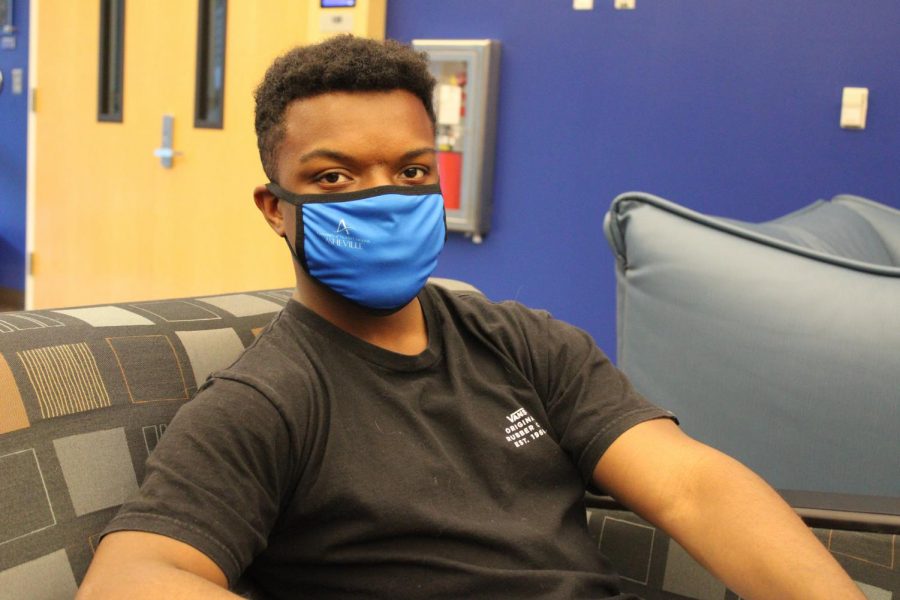UNCA Black Student Association offers members inclusivity and a sense of community
December 5, 2021
Arts & Features writer
UNC Asheville’s Black Student Association creates a sense of inclusivity while also offering members a safe space.
According to Ron Dumas, an organizer for BSA, the group’s focus on inclusion and its overall sense of community is the most important work the organization does for its members.
“It’s important because for me, I’ve always felt, outside of the group, being in Asheville it’s really hard to find groups that represent who you are and what you do. I think just making sure that community is available is a really critical piece of work that they’ve done,” he said.
BSA President Jasmine Washington said the student organization acts as a platform to tackle societal issues such as systemic racism, as well as tie in topics such as LGBTQ rights, disability rights and environmental issues.
“We pretty much focus that in on how it relates to the Black experience, specifically the Black American experience,” she said.
BSA Vice President Keithon Turner said the organization helps promote diversity by providing both communities of color and marginalized communities the opportunity for their voices to be heard.
“I feel like we personally get our voices out there a lot because we do a lot of social media,” he said.
Every week during their meetings, BSA brings a different relevant societal issue to the table for its members to create dialogue and discuss.
“We were talking about immigration and what was going on in the Mexican border a while back,” Turner said. “We were just having a good dialogue about it. It was a bunch of different voices putting their perspectives in.”
BSA also reaches out to different organizations in Asheville such as Hood Huggers, an initiative that showcases the Black history of Asheville and tackles issues in relation to the community such as gentrification.
“I just think that it’s a good eye opener to show how gentrification and other societal norms America has built is affecting Black communities even in small cities like Asheville,” Turner said.
According to Turner, BSA is a safe space where members can feel comfortable in a school that is a predominantly white institution.
“I grew up with being at schools with all minorities, and once I came here, it was definitely a culture shock,” he said. “I feel like BSA can serve as that bridge between the transition between high school and college.”
Dumas said BSA, along with other affinity groups on campus, should have permanent seats within student leadership so they can always be represented in student government.
“You need seven students and four leaders just to be qualified for it, funding and all that. So I think that all those specific organizations should be exempt from that just to make sure they are maintained constantly on campus,” he said.
With many of its members nearing graduation, BSA faces difficulties reaching out and recruiting new members to join the organization.
“Freshman are kind of shy. That’s where the hardest people are to get,” Washington said. “Some of them are still pretty shy, so not really sure about joining campus organization, but I think for the people that we have we’re doing pretty well.”
Dumas, who joined the group shortly before the pandemic, said COVID-19 creates difficulty with communication for the organization.
“I think COVID has made communication really difficult between the group, and also it’s made recruitment for the group really difficult. It’s been hard to have those really massive approaches that I think the group really needs to maintain itself,” he said.
Despite these struggles, BSA’s members overcame them through community support and strong leadership.
“Jasmine is such a patient leader. Even when I can’t help with the sort of events she wants to put on, she still allows me to help and contribute in the ways I can help and still be involved in other things,” Dumas said.
Washington overcame these struggles through consistency by always keeping everyone updated as well as always hosting events at a constant pace.
“Even during the lockdown and everything, still reaching out to people and saying, ‘Hey, you know, we’re having this virtual keynote. You should come visit us on Zoom,’” she said.
Despite graduating next semester, Washington said she hopes to see more community engagement from BSA with the school and Asheville as a whole.
“Hopefully there will just be more community engagement with the greater Asheville area and maybe even taking some out-of-state trips and having more discussions with other state campuses,” she said.
Dumas said he sees BSA growing a lot larger in the future and hopes the organization can break down the barrier of being an affinity group and become a group of culture.
“I want it to be a group of culture, a group that brings in the Langston Hughes and the James Baldwins,” he said. “BSA empowers you to get involved, to continue getting involved despite the lack of representation, despite the issues you may come across.”


















